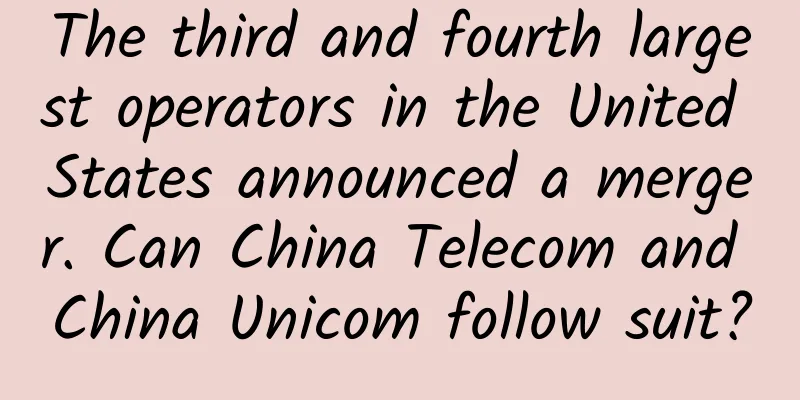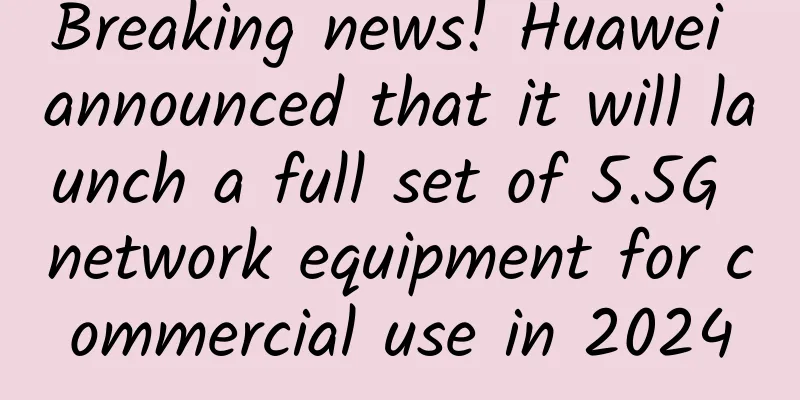The third and fourth largest operators in the United States announced a merger. Can China Telecom and China Unicom follow suit?

|
On April 29, T-Mobile, the third largest telecom operator in the United States, and Sprint, the fourth largest operator, jointly announced that they would complete their merger plan for US$26.5 billion (in essence, T-Mobile's full acquisition of Sprint). The plan is currently awaiting approval from the Trump administration's industry regulatory authorities.
There are many large and small operators in the US telecommunications market, but only four of them operate nationwide, namely AT&T, Verizon, T-Mobile and Sprint. The first two are absolute giants in the industry, and together they account for 80% of the revenue share of the US mobile market. In terms of the number of users, the two giants also have a user share of nearly 70%, with Verizon having 143 million users, AT&T having 135 million users, T-Mobile having 71.5 million users, and Sprint having 60 million users (all data from 2017). In terms of market value, AT&T has a market value of US$214.602 billion, Verizon has a market value of US$212.984 billion, T-Mobile has a market value of US$54.769 billion, and Sprint has a market value of US$26.02 billion. The sum of the market values of the latter two is only one-third of AT&T. Of course, the high market values of AT&T and Verizon are not only due to their communications business, but also because their business atmosphere is very broad. In this context, the survival of T-Mobile and Sprint has been a bit "awkward" in the past few years, because if they fight alone, the financial resources, assets and business layout of these two companies can hardly shake any of the giants in front. Therefore, the ultimate purpose of this merger is to keep warm together, hoping to achieve efficient use of resources through the merger to better cope with the arrival of 5G. It's very simple. The current network resources of the two companies can be fully reused to ensure that there is no need to invest in network construction in the future. After 5G arrives, the two companies only need to build one 5G network, which is a great cost saving for them. Moreover, after the merger of the two companies, the user scale of the new company will reach 132 million, which is comparable to the other two giants, and the space for discourse power in market operation strategies will be greatly increased in the future. Of course, this merger plan is very complicated. The two companies negotiated a merger last year, but ultimately failed. Since taking office, the Trump administration has continued the Obama-era caution on mergers between large companies. For example, Trump once opposed the "AT&T acquisition of Time Warner" transaction, believing that the new company would have too many resources and influence, which would lead to the creation of a monopoly. On the other hand, such a merger of companies with a large overlap in business will inevitably lead to a problem - layoffs, because even if the number of users served has doubled, the number of service personnel does not need to increase much. Trump, who has always played the "improving employment situation in the United States" card, obviously does not want to see this scene, so this plan is still subject to great variables. After talking about the situation in the distant United States, let's turn our attention back to China. The situation of the domestic telecommunications industry is similar to that of the United States. China Mobile is the only dominant player, while China Telecom and China Unicom are far behind. Comparing the data at the end of 2017 -
In terms of the above three core operating indicators, China Telecom and China Unicom combined are far inferior to China Mobile, especially in terms of profitability. Since China Mobile has a firm control over the market, although the latter two have more than 500 million users, their combined profits are only one-sixth of China Mobile's.
Can China Telecom and China Unicom follow the example of T-Mobile and Sprint and enhance their competitiveness through mergers to compete with China Mobile? Of course there is a possibility. The rumors about the merger of China Telecom and China Unicom have been mentioned countless times in the past few years, and various rigorous or humorous feasibility studies have been conducted, proving that the merger of the two does represent the voices and opinions of some people. Objectively speaking, the merger of the two companies is indeed very beneficial to both parties. For example, the two companies can complement each other in 4G network coverage, and the network quality will be greatly improved. For example, in terms of spectrum resources, the frequency continuity will be greater after the merger, and the space for flexible use of network deployment will be much larger, which creates space for the development of the Internet of Things. For example, in terms of main business, the traditional business and innovative business of the two companies can complement each other well after the merger, and can provide users with a good one-stop service experience. For example, in terms of cost savings, the two companies will save at least half of the capital expenditure and cost after the merger, which is a great benefit for the two companies with limited cash flow. There are many more like this. However, how likely is it that China Telecom and China Unicom will merge? As far as we can see, this possibility is very small in the near future (two to three years). China Unicom is currently fully promoting mixed-ownership reform and has achieved some results. For example, in 2017, the overall business situation of the company has stabilized and shown a good development trend. By the first quarter of 2018, its development momentum was no less than that of the other two. For example, in March, in terms of net growth in mobile phone users, Unicom had a net increase of 4.1 million, China Mobile had a net increase of 3.93 million, and China Telecom had a net increase of 6.02 million. While the current mixed-ownership reform is taking effect, the government will not take the initiative to interfere with this process through administrative power.
For the country, the mixed-ownership reform of China Unicom is definitely not a matter of a single enterprise. The government wants to create a model for state-owned enterprise reform through China Unicom in order to find ways to innovate the business models of hundreds of traditional state-owned enterprises. Therefore, China Unicom is a "test field" for the government. Before successfully growing high-quality rice (or failing completely), it will not rashly promote any "hybridization" methods to destroy previous plans. Therefore, in the next five years, the merger of China Telecom and China Unicom is basically impossible to achieve and will only remain in the good wishes of employees or users. |
Recommend
If VoLTE fails to work well with 5G, it will be a failure
The VoLTE function was once a major feature promo...
To get rid of the embarrassment, my country needs a "devil's pace" to accelerate IPv6
Artificial intelligence, big data, cloud computin...
Suyun: Guangzhou Mobile 1G bandwidth VPS monthly payment 188 yuan, Hong Kong 500M-1G large bandwidth VDS monthly payment from 495 yuan
Suyun Technology is Shenzhen Lesuyun Network Tech...
DesiVPS: $3/month KVM-2GB/20GB/2.5TB/Los Angeles Data Center
According to information from LEB, DesiVPS is a f...
Huawei releases Cloud Managed Network 2.0, free trial available from today
On August 21, 2018, Huawei held a cloud managemen...
edgeNAT: 840 yuan/month-Daul E5 2670v3/32GB/1TB SSD/10M bandwidth/Korea data center
Previously, I mainly shared information about edg...
Six steps to prepare for a 5G IoT future
Gartner predicts that by 2023, there will be 49 m...
The hidden threat of smart home privacy leakage comes from the router
In our daily life, we can use smartphones to cont...
There is no optical communication without optical modules, is it true?
Over the past 100 years, human beings have develo...
LRU implementation with expiration time
[[382833]] I saw this algorithm a long time ago w...
AIOps implementation revealed! See how three WOT experts make AIOps a reality
[51CTO.com original article] On June 21, the WOT2...
Baidu responds to real-name registration: Implementation in accordance with regulations will not affect search
Recently, Baidu Netdisk released an announcement,...
White label revolution, fighting together to carve out a bloody path
In recent years, the hottest topic in the network...
Review of the top ten 5G trends in 2021: coverage, applications, and a future
Looking back at the communications industry this ...
5G small base stations are about to take off!
On the one hand, the higher frequency band of 5G ...









